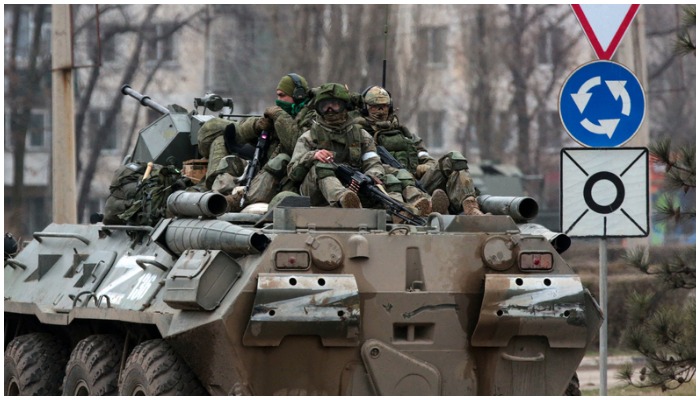The Russia-Ukraine conflict and the challenge for East Asia
Biden says the Russia-Ukraine crisis has the potential to turn into World War III
April 11, 2022

There are signs that the Russian aggression against Ukraine may have a spillover effect on the Korean peninsula.
Can the hawkish President-elect Yoon Suk-yeol seize the opportunity and lead South Korea into a safe zone?
Till now, other than the North Atlantic Treaty Organisation (NATO) members, only a few countries are involved in the conflict. But as President of the United States Joe Biden rightly said, this crisis has the potential to turn into World War III. In that case, East Asian countries will surely be drawn into the conflict.
The Republic of Korea, popularly called South Korea, has already chosen to stay with the United States. After all, Washington is the sole and trusted security guarantor of Seoul. On the other hand, a golden opportunity to ensure North Korean neutrality in the conflict has slipped away.
The Democratic People’s Republic of Korea, better known as North Korea is left with only two options: either side with Russia or stay neutral.
Former US President Donald J Trump had probably envisioned this scenario and thus tactically pursued peace with the supreme leader of North Korea. Yet, his meetings with Kim Jong-un in Singapore and the Korean demilitarised zone failed to end the stalemate on the nuclear issue.
For North Korea, having nuclear weapons remains a question of life or death.
On the other hand, neither South Korea nor the United States of America could afford to see a dictator like Kim Jong-un pushing the nuclear button of his choosing.
The recent threat of pre-emptive strikes from the supreme leader Kim Jong-Un’s sister speaks volumes about North Korean intentions as well as preparations. Kim Yo-jong has warned South Korea that “in case (South Korea) opts for a military confrontation with us, our nuclear combat force will inevitably have to carry out its duty”.
With that in mind, how risky is it for Seoul to side with the United States of America, when its arch-rival threatens her with atomic weapons?
It’s an admitted fact that in case of a full-fledged war against each other, the two Koreas will simply be wiped off the face of the earth? Both countries share a 238-kilometre land border, but the distance of Seoul from the demilitarized zone is only around 23 km.
Strategically, it gives an added advantage to Kim Jong-un. He can order the raining down of thousands of missiles on the South Korean capital. Such a spectacular attack will leave no chance for even the best anti-missiles defence system to stop aggression. At the top of it, North Korean border snipers can use guns to pick out their targets.
However, efforts to restart bilateral dialogue can ease the tension. President-elect Yoon Suk-yeol can play a pivotal role in this regard. Throughout his electoral campaign, Yoon Suk-yeol had remained tough on the question of dealing with Kim Jong-Un.
But, that was electoral rhetoric. It’s now time to be more realistic.
President Yoon needs an out-of-the-box approach to rekindle hopes for a peaceful peninsula. He can assure Pyongyang that Beijing and Moscow may have been its best diplomatic, economic and security guarantors but there is an alternative.
As a presidential candidate, Yoon had vowed national unity and reconciliation. After taking the reign, he has an opportunity to further raise his stature.
Looking for a bilateral dialogue similar to the one held in 1991 is the need of the hour.
Innovative approaches should be tried to convey the sincerity of purpose. One good gesture can be inviting the North Korean supreme leader to Yoon Suk-yeol’s oath-taking ceremony. However symbolic, it can break the ice and restart the bilateral talks.
As for the United States, it may not appreciate this bilateral format. Throughout Trump’s era, the United States of America had asked: What do we get out of it? While the North Korean regime cannot afford to give in to Washington, it can definitely opt for a good bargain with Seoul. In the current situation, even that serves as a big prize for the Biden administration. At a later stage, Pyongyang and Washington can be encouraged to cut a deal.
Resumption of a multilateral dialogue has now become impossible. There is no room left for the Republic of Korea, North Korea, Russia, China, Japan and the United States of America to join hands.
For invoking economic sanctions, Russia has already halted WWII peace talks with Japan on the Kuril Islands. In the current situation, Moscow will not only stay away from multilateral dialogue on the Korean issue but discourage Pyongyang from entering into a bilateral one with Washington.
Throughout his campaign, President-elect Yoon Suk-yeol also angered China. So, there can be no support for any such dialogue from Beijing as well.
China and North Korea are preparing themselves to be the next potential target of the West. They are watching closely how their neighbour Russia is being economically strangulated. Both Beijing and Moscow will try their best to warn Pyongyang of the short term gains from the talks.
The outgoing South Korean President Moon Jae-in had proved himself to be the master of diplomacy by offering lucrative deals to North Korea. Filling his shoes will remain a challenge for his hawkish successor, Yoon Suk-yeol.











